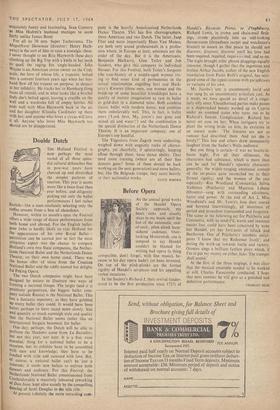Before Opera
As the annual good works of the Handel Opera Society approach, my heart sinks and usually
In the Society's Richard I, their revival (under- stood to be the first production since 1727) of Handel's Riccardo Prinz°, re d'Inghilterra, Richard Lewis, in- and chain-mail flesh-
ings, strode plaintively into an odd-looking throne-room (threadbare carpet and watchman's brazier) to assure us that peace he should not discover, discover, discover until his love had been requited, requited, requi-i-i-i-ited, and so on.
The night brought other phrase pluggings equally tiresome, though I gather that the ingenious and tireless Arthur Jacobs, author of the new English translation from Paolo Rolli's original, has miti- gated some of the repeat-stanzas with paraphrases or variants of his own.
Mr. Jacobs's text is uncommonly lucid and was sung by, an uncommonly articulate\ cast. As
a result, we were spared no detail of a singu- larly silly story. Unauthorised parties make passes at a shipwrecked beauty washed up on Cyprus under an assumed name who turns out to be
Richard's fiancee. Complication-; Richard has never set eyes on her.. When intriguers try to plant the wrong bride on him, he exclaims in an uneasy aside: The features are not as rumour had described them. And yet she is• lovely!' This line and others drew unmannerly laughter from the Sadler's Wells audience.
But one thing is certain—it was no hearts-in- boots night. For all their sillinesses, the characters had substance, which is more than can be said for Handel's operatic characters generally; the widely-ranging emotional content of the set-pieces quite reconciled me to their formal rigidity; and the women of the cast especially—Rae Woodland (Constantia), Sylvia Stahlman (Pulcheria) and Maureen Lehane (Orontes)--sang with outstanding adroitness, lustre and power. At the end of Act 2, Miss Woodland's and Mr. Lewis's love duet soared and hovered intertwiningly, all Mustiness of period and procedure transcended and forgotten.
The scene in the following act for Pulcheria and Constantia, with its tendril'd, warm and innocent mezzo line, could have been conceived by none but Handel, yet has foretastes of Gluck and Beethoven. One of Pulcheria's numbers antici- pates 'I know that my Redeemer liveth'; and during the work-up towards battle and victory, Orontes sings a brilliant fanfare piece which, if I'm to put my money on either, licks 'The trumpet shall sound.'
At the first of the three stagings, it was clear that the musical ensemble needed to be worked at still. Charles Farncombe conducted. I hope that next summer he will give us a polished and definitive performance.
CHARLES REID
























 Previous page
Previous page